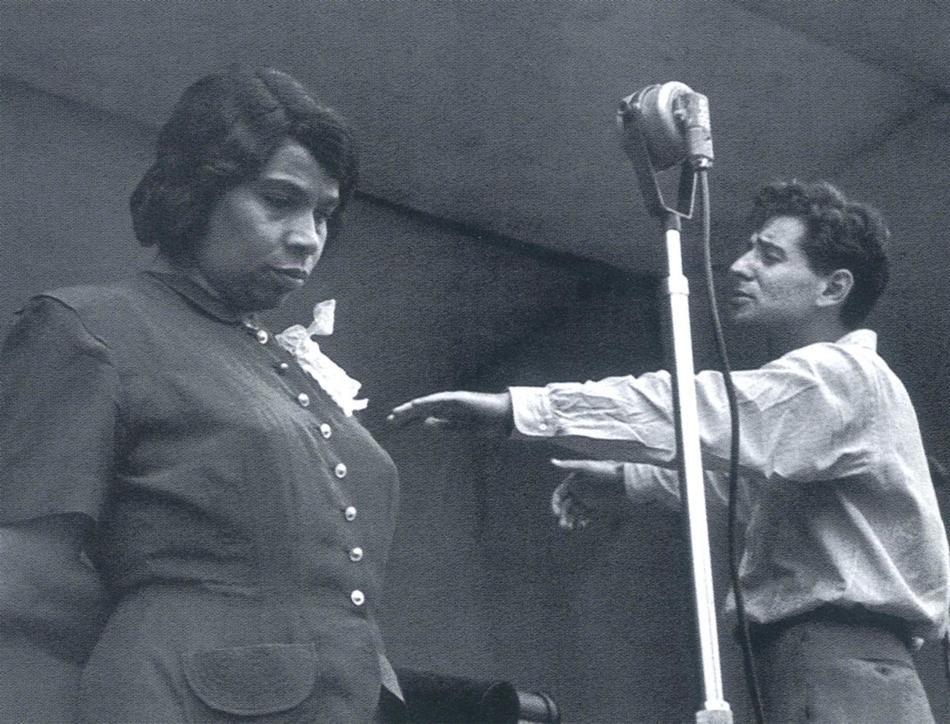If Leonard Bernstein had stayed in his native Massachusetts, or if he had been born a generation earlier, would he have become the Leonard Bernstein? Probably not. It's hard to picture this musical, political, and social Dionysus confining himself to 1950s Back Bay and Cambridge. Or Philadelphia, Chicago, or Paris, for that matter. No, it had to be New York after the war. Lenny, Manhattan, Broadway, and the New York Philharmonic fell in love and danced into one another's arms, while FM radio, stereo LPs, and television allowed the rest of us in on the party. Bernstein, a con brio hurricane, had to blow in when and where he did.
That's one motif of Leonard Bernstein, American Original, a book of essays and photographs celebrating the man who embodied the joy of music for millions.
In one of history's most improbable debuts, Bernstein - American, Jewish, 25 years old - was called to Carnegie Hall on November 14, 1943, to pinch-hit for conductor Bruno Walter, who was in bed with the flu. Bernstein had been appointed an assistant conductor of the Philharmonic only two months before, and this concert was to be broadcast nationally and to the armed forces overseas. "He acknowledged the doubtful but polite applause," writes Burton Bernstein '54JRN, the composer's younger brother and a former New Yorker staffer, "and proceeded to conduct one hell of a concert - a succès fou that nudged some war news off the front pages the next day."
Bernstein was regularly on the front pages from that night until his death in 1990. We know the basics: On the Town, Wonderful Town, Candide, West Side Story, the score for On the Waterfront, symphonies and songs, and his Mass. We remember his years as music director and music director laureate of the Philharmonic, his concerts in Vienna and operas at La Scala, his broadcasts of Young People's Concerts, his balletic conducting technique, the parties, and the sometimes eyebrow-raising political activism.
Burton Bernstein and Barbara B. Haws, the Philharmonic's archivist, have compiled a Festschrift that illuminates new facets of a much-analyzed career, though the chapters are so varied in tone and subject that they don't seem to belong in the same book. (Burton contributes two essays and several "a brother's recollection" sidebars.)
The most illuminating essay is by John Adams, the composer of the operas Nixon in China and The Death of Klinghoffer. Adams presents a clear rundown of Bernstein's strengths and weaknesses as a composer, of his taste in programming as a music director, and of his unequaled role as a teacher and an "American cultural icon."
"I recall in sharp clarity an afternoon broadcast of a piece called 'The Right of Spring,' or so I thought was the title," writes Adams of a preteen epiphany shared by thousands. "The broadcast included Bernstein speaking to the audience before conducting the music. That was a shock, because classical music up to this point had been the province of mysterious, remote foreign-born 'maestros.'" Adams equally found it a delight "to turn on the radio and hear the voice of an American speaking in the common vernacular, but with vivid images of the music of . . . Igor Stravinsky and Charles Ives. And then I saw on a magazine cover the face that went with this charming voice - Bernstein's face - and I thought 'this guy looks more like James Dean than he looks like Toscanini.'"
The telegenic face and dynamic delivery were part of the story, as was Bernstein's involvement in a checklist of liberal causes - nuclear disarmament, the anti-Vietnam War movement, the environment, civil rights. Critics who charged him with naïveté in his politics were not far off the mark, as when in 1970 he and his wife hosted members of the Black Panthers in their Park Avenue home for a legal-defense fundraiser. Tom Wolfe skewered the Bernsteins in his New York magazine article called "Radical Chic."
As the mostly admiring Burton Bernstein writes, "I simply couldn't believe it. Lenny was still naïveté about the press, even after decades of harsh lessons. . . . How could [he and his wife] be so monumentally dumb?"
Dumb strategically, perhaps; but the book leaves little doubt about Bernstein's sincerity - even in what some saw as his musical exaggerations, his antics on the podium, and his pie-in-the-sky politics.
Perhaps, like Ozzie and Claire in On the Town, he just got carried away.



